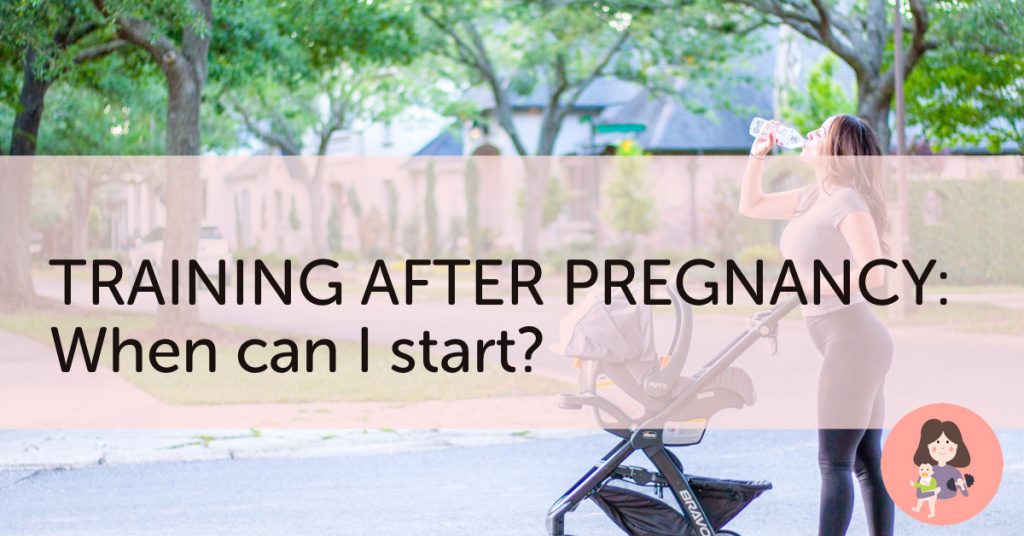You’ve delivered your little wonderful baby to this world, congratulations Mama! You might be feeling better already, have more energy and slowly but surely would like to bring your body back to its pre-pregnancy state, or maybe you’re just eager to start working out.
But when can you actually start doing sports or working out? What should you pay attention to? What is the best way to start? In this article, I’ll answer all of these questions.

When to start?
After baby delivery, it’s common to have postpartum bleeding or discharge, which is also known as lochia. After a vaginal delivery, it could usually last up to 6 weeks, after Cesarean cessation up to 8 weeks. However, everyone is different and the duration of bleeding can differ from person to person. During this time your body is busy healing itself and you should not work out. Let your body heal first! In any case, you should talk to your doctor. Believe me, everyone will be trying to give you advice on what you should do; your mom, your sister, your neighbor, or even some lady across the street. Do not listen to anyone but your doctor!
If your doctor gives you green light, then and only then you can start with recovery and working out.
What to start with?
Again, your doctor will know best what exactly you can start with. In my case, 2-3 months after my C-section I could finally start with basic recovery of my pelvic floor muscles, but still couldn’t do other exercises. One month later, I was allowed to start with the recovery of my abdominal muscles as well, and two months later I could finally start to train my whole body. However, this is how it worked for me in my case. In your case it could be completely different, you might not need that much time for recovery, or you might need even more.
Regardless of the duration, the sequence is usually the same. You should start with the recovery of your core muscles, which also includes your abdominal, back and pelvic floor muscles. But what does that mean and why is it important?
During pregnancy, the belly is growing, which affects abdominal and back muscles. They get stretched out a lot, and they get thin. This also means they get very weak and have no ability to function in the correct way, i.e., holding a natural posture, spine and organs. Exactly the same happens to the pelvic floor muscles as the weight of the growing baby pushes on them. If you had a vaginal delivery, this stretches and injures the pelvic floor muscles even more.
Thus, the goal is to recover and strengthen your weakened muscles, so that they can function in a NORMAL way, as the should function. This step isn’t an option, this step is a MUST. If you are not patient and eager to start right away with a demanding physical activity, you risk many health problems in the future, e.g., pelvic organ prolapse (which also can cause uncontrollable leaking of urine, gas or even poop), sexual pain, lower back pain, bad posture.
*What kind of exercises you can do for the postpartum recovery I’ll show you in another post.
But what if you are still not allowed to do anything? Well, you can still go for a walk! You can change the speed of your walk depending on your energy level. This can be an amazing workout, and the fresh air is great for both, you and your baby.
Diastasis Recti
Before you start with the recovery, you should also check if you have Diastasis Recti. You can check yourself easily at home. Lie down on the floor and put your hand crossways your belly just above the belly button. You can bend your legs at your knees or just pull your toes towards your head. At the same time raise your head until you will feel the abdominal muscles under your hand. You should not consciously contract your belly, try to leave it completely relaxed. Now you’ll feel the muscles, on the right and on the left side, but also a gap between it. How many fingers is this gap wide and how deep can you push them into it? If the gap is as wide or wider than two fingers, you have Diastasis Recti. This means you should try to close the gap and avoid some exercises at first.
Here is a demonstration video I’ve made:
Also, make sure to check out this post to read more about Diastasis Recti.
One more little tip from me:
Be patient! Don’t rush your recovery. Your body took 9 months to grow your baby and bring her to this world. Give your body at least the same amount of time – 9 months – to recover properly. You got it, Mama!



